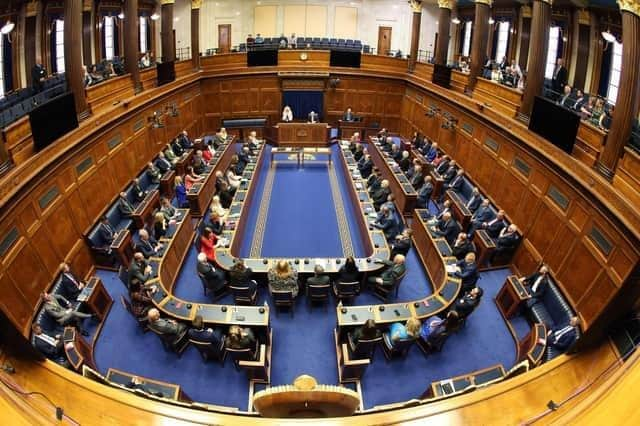Owen Polley: A revived Stormont is more likely to go for populist policies than to do things such as boost the economy


So it proved again last week, when the US envoy, Joe Kennedy III, came to Belfast with a group of ‘potential investors’, as well as representatives of companies that already operate here.
There’s nothing wrong with being warm and hospitable, of course – particularly if it’s with the aim of attracting money and jobs to Northern Ireland. It’s another matter accepting patronising political lectures from Americans, urging us to accept without dissent a trade border that separates us from the rest of the UK.
Advertisement
Hide AdAdvertisement
Hide AdAnd that was indeed the overarching message from this delegation, which was originally conceived as a way of giving a PR boost to a newly revived assembly.
On its eve, the US Ambassador, Jane Hartley, advised unionists to “take advantage” of the Windsor Framework, by restoring the Assembly at Stormont. The implication was that, if we just embraced being permanently cut off from the British national economy, American dollars would start to flow.
The University of Ulster’s senior economist, Dr Esmond Birnie, was not convinced by this argument. In a speech at the Belfast Junior Chamber of Commerce and Belfast Rotary on Friday, he pointed out that investors are most put off coming to Northern Ireland by low levels of productivity.
On average, each worker here creates less economic output than his counterparts in the rest of the UK (and much less than an employee in France or Germany).
Advertisement
Hide AdAdvertisement
Hide Ad“Big businesses are unsentimental affairs,” Dr Birnie said, “They are profit-seeking and it is a myth to think the exhortations of politicians (even presidents) influence them all that much.”
He argued that the restoration of Stormont would not create “an economic upsurge” and explained that the “poor quality decision making” of previous devolved administrations in fact exacerbated Northern Ireland’s economic difficulties.
In essence, the speech pointed out that our economy struggles because of long-term problems. These won’t be overcome by the framework, which adds extra costs for businesses, much less any short-term incentives to invest that emerge as a way of disguising its effects.
This is a compelling point of view, but the government remains determined to claim that its deal will benefit Northern Ireland, even though it cannot produce a meaningful shred of evidence for this contention. At a Westminster committee meeting last week the secretary of state, Chris Heaton-Harris, insisted that ‘goods are flowing smoothly into NI’ thanks to the new system of green and red lanes.
Advertisement
Hide AdAdvertisement
Hide AdIt was a vague statement, which is likely to look particularly silly this week if, as expected, inspectors and vets at our ports go on strike. But he was notably less unflappable when Lord Dodds asked him to justify his previous claim that consumers here can now buy plants and seeds via mail-order, due to the framework.
This performance was entirely typical of Heaton-Harris’s comments on the sea border, which are full of feel-good fluff, but disintegrate quickly upon contact with actual detail.
That’s an ominous sign, as negotiations between the DUP and the government (apparently) continue. Mr Heaton-Harris said that these talks were in “their final phases and in a much more positive space than they have been previously”.
It’s reported that the DUP wants legislation that guarantees Northern Ireland’s place in the UK internal market. But when he was asked whether a bill like that would be in the King’s Speech, the secretary of state would only hedge, “I have always said if we can get that legislation correct then we will introduce it. Until I know that is part of the answer to the question, it doesn’t exist”.
Advertisement
Hide AdAdvertisement
Hide AdThis was another Heaton-Harris sentence whose meaning was elusive.
The King’s Speech, which opens the new session of parliament and sets out the government’s plans, will take place on the 7th of November. Any legislation promised in it will then have to be drafted and introduced to the House of Commons.
It takes most laws around one year to make their way through parliament and that process can be significantly longer if their content is controversial, like the old Northern Ireland Protocol Bill.
It’s worth remembering that three-quarters of the UK population wants a general election by next May and the last possible date for a poll is the 28th of January 2025. This government, even if it introduces an ambitious programme of legislation including a bill for Northern Ireland, will struggle to deliver on most of its aims before campaigning begins.
That brings us back to the DUP and its thinking.
Advertisement
Hide AdAdvertisement
Hide AdLast week, Sir Jeffrey Donaldson gave an interview to the Sunday Telegraph, in which he compared the government’s financial commitment here (which includes a £14 billion subvention over and beyond the taxes that we pay) unfavourably to recent cross-border ‘investments’ from Dublin. On a similar theme, at the DUP’s recent conference, the East Belfast MP, Gavin Robinson, continued to push the improbable idea that Northern Ireland is treated badly by the Treasury.
These claims do not inspire confidence in the integrity of the party’s negotiating position or allay suspicions that it could include a mercenary element. Neither do they provide reassurance that, if Stormont were restored, the DUP would prioritise long-standing economic problems and reforming public services, rather than resorting to the easy populism that always seems to go alongside devolution.